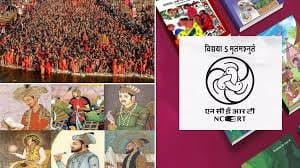
So, it looks like there’s a pretty big shake-up happening in India’s education system, and it’s got a lot of people talking. The NCERT (National Council of Educational Research and Training) has made some pretty significant changes to the textbooks, and the most noticeable shift is the removal of content related to the Mughals. At the same time, there’s a new focus on topics like the Maha Kumbh and Shakti Peeths. Naturally, this has raised eyebrows and sparked some heated debates about how history is being represented—and what that means for India’s cultural and religious story.
Mughals Out, But Why?
The decision to remove sections on the Mughals has definitely caught a lot of people off guard. After all, the Mughals have been a huge part of Indian history for centuries. Their influence on art, architecture, governance, and culture is pretty undeniable. So, pulling them out of the curriculum is raising some serious questions. Critics are worried that this move could oversimplify India’s rich, complex past. It’s like skipping over a chunk of history that helped shape the country into what it is today.
Enter Maha Kumbh and Shakti Peeths
On the flip side, the addition of the Maha Kumbh and Shakti Peeths definitely gives the textbooks a more spiritual twist. The Maha Kumbh, after all, is one of the world’s largest religious gatherings, and it plays a huge role in Hindu traditions. Its inclusion shows just how significant such practices are in shaping India’s cultural identity. Then, there are the Shakti Peeths, important pilgrimage sites that reflect the country’s religious diversity. By focusing on these, the curriculum is really leaning into India’s deep spiritual roots, which could offer students a stronger sense of their heritage.
A Bigger Shift in Education?
So, what’s really going on here? Some folks argue that the changes are a good thing, providing a more balanced look at India’s cultural and spiritual history. There’s this push to emphasize India’s indigenous traditions and to foster a sense of pride in the country’s roots. But others aren’t so sure. They’re concerned that the removal of the Mughals could be part of a larger trend to rewrite history, particularly in ways that align with current political climates. It’s definitely a controversial shift, and one that’s got a lot of people questioning what kind of history students are going to be learning.
Reactions Are All Over the Place
As you can imagine, reactions have been all over the map. Some people think it’s about time India started focusing more on its own traditions, believing it’ll help build a sense of national pride. But there are also critics who feel like this change downplays the complex, diverse history of India. Many see the Mughals as an essential part of that story, so their removal from textbooks feels like erasing a piece of the puzzle. It’s also raised questions about the potential for historical revisionism—and whether this is a political move more than an educational one.
Wrapping It Up
Whether or not these changes will have a long-term impact on India’s education system remains to be seen. What’s for sure is that this debate is only getting started. The larger question here is how we strike a balance between honoring the past and making sure students get a well-rounded, accurate picture of history. As the conversation around these revisions continues, it’ll be interesting to see how things play out and what kind of history future generations will learn.





